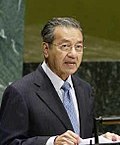Portfolio Office Bearer Party Constituency Term start Term end Prime Minister Dato' Seri Dr. Mahathir Mohamad MP UMNO Kubang Pasu 27 October 1990 3 May 1995 Deputy Prime Minister Abdul Ghafar Baba MP UMNO Jasin 27 October 1990 15 October 1993 Dato' Sri Anwar Ibrahim MP Permatang Pauh 1 December 1993 3 May 1995 Minister in the Prime Minister's Department Dato' Syed Hamid Albar MP UMNO Kota Tinggi 27 October 1990 3 May 1995 Abu Bakar Mustapha MP PBB Kuala Rajang Datuk Bernard Giluk Dompok MP PDS Penampang 21 August 1994 Minister of Finance Dato' Sri Daim Zainuddin MP UMNO Merbok 27 October 1990 15 March 1991 Dato' Sri Anwar Ibrahim MP Permatang Pauh 15 March 1991 3 May 1995 Minister of Defence Dato Sri Mohd. Najib Abdul Razak MP UMNO Pekan 27 October 1990 3 May 1995 Minister of Home Affairs Dato' Seri Mahathir Mohamad MP UMNO Kubang Pasu 27 October 1990 3 May 1995 Minister of Justice Dato' Syed Hamid Albar MP UMNO Kota Tinggi 27 October 1990 3 May 1995 Minister of International Trade and Industry Dato' Seri Rafidah Aziz MP UMNO Kuala Kangsar 27 October 1990 3 May 1995 Minister of Education Dato' Sri Anwar Ibrahim MP UMNO Permatang Pauh 27 October 1990 15 March 1991 Datuk Amar Sulaiman Daud MP PBB Petra Jaya 15 March 1991 3 May 1995 Minister of Lands and Co-operatives Development Tan Sri Sakaran Dandai MP UMNO Semporna 27 October 1990 16 March 1994 Datuk Osu Sukam MP Papar 21 August 1994 3 May 1995 Minister of Transport Dato' Seri Dr. Ling Liong Sik MP MCA Labis 27 October 1990 3 May 1995 Minister of Agriculture Dato' Seri Sanusi Junid MP UMNO Jerlun-Langkawi 27 October 1990 3 May 1995 Minister of Health Dato' Lee Kim Sai MP MCA Hulu Langat 27 October 1990 3 May 1995 Minister of Culture, Arts and Tourism Dato' Sabbaruddin Chik MP UMNO Temerloh 27 October 1990 3 May 1995 Minister of Housing and Local Government Dato' Dr. Ting Chew Peh MP MCA Gopeng 27 October 1990 3 May 1995 Minister of Foreign Affairs Dato' Seri Abu Hassan Omar MP UMNO Kuala Selangor 27 October 1990 15 March 1991 Dato' Abdullah Ahmad Badawi MP Kepala Batas 15 March 1991 3 May 1995 Minister of Human Resources Dato' Lim Ah Lek MP MCA Bentong 27 October 1990 3 May 1995 Minister of Domestic Trade and Consumerism Datuk Amar Sulaiman Daud MP PBB Petra Jaya 27 October 1990 15 March 1991 Dato' Seri Abu Hassan Omar MP UMNO Kuala Selangor 15 March 1991 3 May 1995 Minister of Public Enterprises Mohamed Yusof Mohamed Noor MP UMNO Besut 27 October 1990 3 May 1995 Minister of Rural Development Abdul Ghafar Baba MP UMNO Jasin 27 October 1990 15 October 1993 Dato' Annuar Musa Senator 1 December 1993 3 May 1995 Minister of Works Dato Sri Leo Moggie Irok MP PBDS Kanowit 27 October 1990 3 May 1995 Minister of Science, Technology and Environment Dato Sri Law Hieng Ding MP SUPP Sarikei 27 October 1990 3 May 1995 Minister of Energy, Telecommunications and Posts Dato' Seri Samy Vellu MP MIC Sungai Siput 27 October 1990 3 May 1995 Minister for Primary Industries Dato' Seri Lim Keng Yaik MP Gerakan Beruas 27 October 1990 3 May 1995 Minister of National Unity and Community Development Dato' Napsiah Omar MP UMNO Kuala Pilah 27 October 1990 3 May 1995 Minister of Youth and Sports Dato' Annuar Musa UMNO Senator 27 October 1990 1 December 1993 Abdul Ghani Othman MP Ledang 1 December 1993 3 May 1995 Minister of Information Dato' Mohamed Rahmat MP UMNO Pulai 27 October 1990 3 May 1995 

